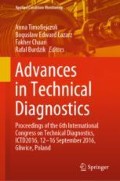Abstract
The paper is focused on the problem of performance optimization of meta-learning schemes for context-based fault detection. The context-based reasoning is developed to increase the effectiveness of well-known classification methods due to the need for designing high-efficient fault diagnosis systems. The most important problem to solve in this approach is to find optimal structures as well as optimal values of behavioural parameters of component classifiers. This problem has been formulated as a multi-objective optimization task, and in the next step, the global criterion method was adapted for expressing the meta-criterion function taking into account different statistical measures (objectives) obtained from a table of confusion. It was decided to make use of the generational genetic algorithm in order to search for the optimal solution. The subject of the case study was the scraper conveyor simulator. A few variants of the meta-learning scheme for context-based fault detection were elaborated using common machine learning methods such as decision tree, naive Bayes, Bayesian network and k-nearest neighbours. The obtained results prove that the proposed approach has both theoretical and practical relevance and thus it should find potential applications in real-world conditions.
References
Akthar F, Hahne C (2004) Combining pattern classifiers: methods and algorithms
Cenacewicz K, Katunin A (2016) Modeling and simulation of longwall scraper conveyor considering operational faults. Stud Geotech Mech 38(2):15–27
Cholewa W (2004) Expert systems in technical diagnostics. In: Korbicz J, Kowalczuk Z, Kościelny J, Cholewa W (eds) Fault diagnosis. Models, artificial intelligence, applications. Springer, Berlin Heidelberg, pp 591–631
Goldberg DE (1989) Genetic algorithms in search, optimization and machine learning, 1st edn. Addison-Wesley Longman Publishing Co., Inc., Boston, MA, USA
Hofmann M, Klinkenberg R (2013) RapidMiner: data mining use cases and business analytics applications. Chapman & Hall/CRC
jMetal: it stands for Metaheuristic Algorithms in Java—website, October 2016. Available at http://jmetal.sourceforge.net/
Kalisch M (2016) Fault detection method using context-based approach. Springer International Publishing, Cham, pp 383–395
Kalisch M, Przystałka P, Timofiejczuk A (2015) Actuator fault diagnosis using single and meta-classification strategies. Springer International Publishing, Cham, pp 132–149
Kozielski M, Sikora M, Wróbel Ł (2015) Disesor—decision support system for mining industry. In: Ganzha M, Maciaszek L, Paprzycki M (ed) Proceedings of the 2015 federated conference on computer science and information systems, vol 5 of Annals of computer science and information systems. IEEE, pp 67–74
Kuncheva LI (2004) Combining pattern classifiers: methods and algorithms. Wiley-Interscience, New Jersey
Liebowitz J (1997) The handbook of applied expert systems. CRC Press LLC
Marler RT, Arora JS (2004) Survey of multi-objective optimization methods for engineering. Struct Multi Optim 26(6):369–395
Moczulski W (2004) Methods of acquisition of diagnostic knowledge. Springer Berlin Heidelberg, Berlin, Heidelberg, 675–718
RapidMiner: predictive analytics platform—website, October 2016. Available at http://rapidminer.com/
Turney PD (1996) The management of context-sensitive features: a review of strategies. In: Proceedings of the ICML-96 workshop on learning in context-sensitive domains, 60–65
Vavak F, Fogarty TC (1996) A comparative study of steady state and generational genetic algorithms for use in nonstationary environments. Springer Berlin Heidelberg, Berlin, Heidelberg, pp 297–304
Wachla D, Przystałka P, Kalisch M, Moczulski W, Timofiejczuk A (2016) Development of expert system shell with context-based reasoning. Springer International Publishing, Cham, pp 369–382
Woźniak M, Grańa M, Corchado E (2014) A survey of multiple classifier systems as hybrid systems. Inf Fusion 16(0):3–17 (Special Issue on Information Fusion in Hybrid Intelligent Fusion Systems)
Yang J, Ye C, Zhang X (2001) An expert system shell for fault diagnosis. Robotica 19:669–674
Acknowledgements
The research presented in the paper was partially financed by the National Centre for Research and Development (Poland) within the framework of the project No. PBS2/B9/20/2013. The part of the research was also financed from the statutory funds of the Institute of Fundamentals of Machinery Design, Silesian University of Technology, Gliwice, Poland.
Author information
Authors and Affiliations
Corresponding author
Editor information
Editors and Affiliations
Rights and permissions
Copyright information
© 2018 Springer International Publishing AG
About this paper
Cite this paper
Przystałka, P., Kalisch, M., Timofiejczuk, A. (2018). Genetic Optimization of Meta-Learning Schemes for Context-Based Fault Detection. In: Timofiejczuk, A., Łazarz, B.E., Chaari, F., Burdzik, R. (eds) Advances in Technical Diagnostics. ICTD 2016. Applied Condition Monitoring, vol 10. Springer, Cham. https://doi.org/10.1007/978-3-319-62042-8_26
Download citation
DOI: https://doi.org/10.1007/978-3-319-62042-8_26
Published:
Publisher Name: Springer, Cham
Print ISBN: 978-3-319-62041-1
Online ISBN: 978-3-319-62042-8
eBook Packages: EngineeringEngineering (R0)

